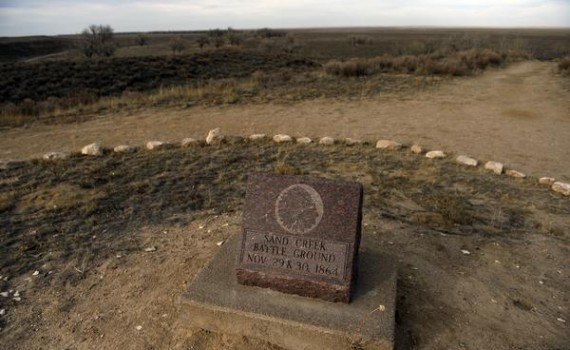Descendants of victims of the Sand Creek Massacre have filed a class-action lawsuit in Denver against the federal government, seeking reparations they claim were never paid for the slaughter of their Cheyenne and Arapaho ancestors 149 years ago.
The lawsuit, filed Thursday in U.S. District Court on behalf of four Oklahoma-based members of the Sand Creek Massacre Descendants Trust, is the most concrete step taken in decades bydescendants long frustrated by politics, inaction and divisions in their ranks.
The complaint accuses the government and its agents of lawless behavior and hollow promises surrounding one of the darkest moments in Colorado history.
At dawn on Nov. 29, 1864, federal soldiers attacked peaceful Indians camped on the ice-encrusted banks of Sand Creek in what is now southeastern Colorado, slaughtering an estimated 163 — mostly women, children and the elderly — and desecrating their bodies.
The U.S. government in an 1865 treaty acknowledged wrongdoing and promised reparations of land and cash to survivors and relatives of victims.
The crux of the legal argument going forward will be whether the government ever paid that debt. Descendants claim it has not, while government officials have indicated they will argue otherwise.
“It’s been a long road and we’re ready to go,” said Robert Simpson, a Methodist minister from Anadarko, Okla., and one of the plaintiffs. “We are focused on our ancestors. They are the ones who want us to do this. We will never forget them and what happened.”
The trust says it has identified more than 15,000 descendants through decades of genealogical research and recruitment. A judge will decide whether the case meets requirements for class-action status.
Trust lawyers say either the federal government or the courts are responsible for establishing exactly who is a rightful descendant.
But the lawsuit does not seek to identify exactly how much is allegedly owed descendants — one of several open questions.
The lawsuit allows that it is very likely Congress appropriated some money in 1866 to reimburse bands of Cheyenne and Arapaho that suffered at Sand Creek. But it alleges that only a portion was paid, the amount was insufficient and it was given to tribes rather than individuals as spelled out in the Treaty of the Little Arkansas.
The Department of the Interior has since then controlled and held in trust reparations owed to the plaintiffs and their ancestors but has never accounted for it, the lawsuit claims.
Interior department spokeswoman Jessica Kershaw said the department would not comment on pending litigation.
Read more
Eric Gorski: 303-954-1971, egorski@denverpost.com or twitter.com/egorski
Follow: @Denverpost on Twitter|Denverpost on Facebook

